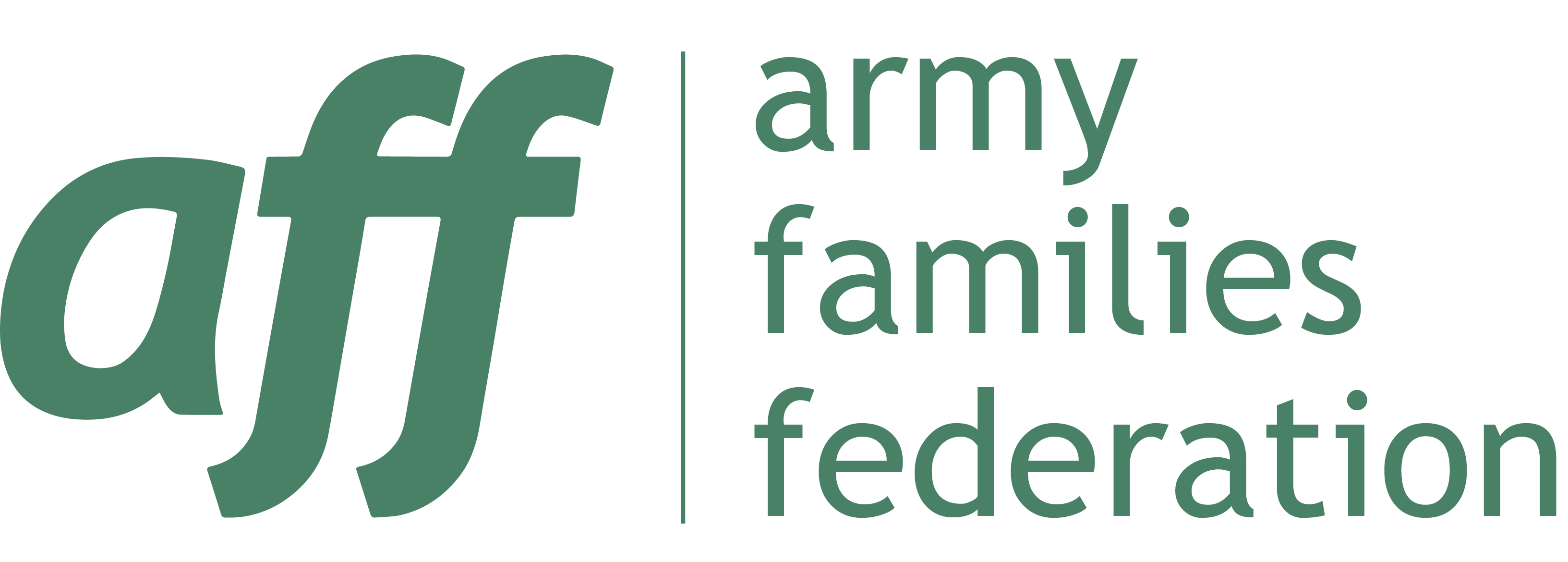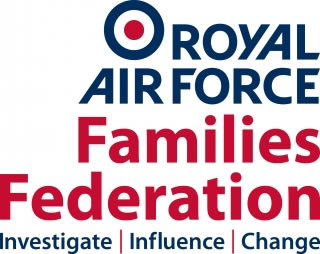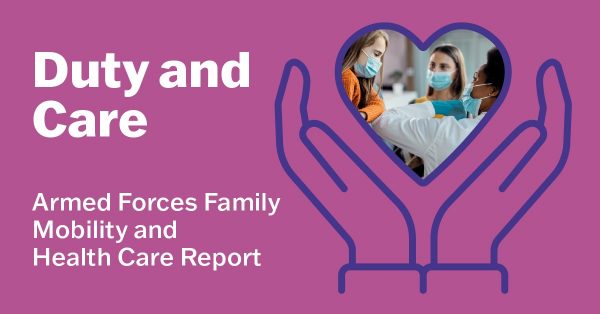Today the Naval, Army and RAF Families Federations launch the ‘Duty and Care: Armed Forces Family Mobility and Health Care’ report. This report provides practical recommendations to inform and tackle disadvantage as well as improve health outcomes for families required to move frequently due to Service need.
This study, supported by NHS England and NHS Improvement and the MOD Families Team, was conducted by the Veterans and Families Institute for Military Social Research at Anglia Ruskin University (ARU), and sponsored by the three Families Federations. Families have shared their experiences to form the basis of this research and as the Foreword says, “Their voices are the most important ones here”.
The recommendations were co-created by key stakeholders to identify the clearest possible lines of responsibility and accountability.
Top line recommendations are:
- Gaining confidence of families – that the Service will support them, but the Service needs to be kept informed about any health factors that might affect postings
- Building on existing frameworks – to support postings – ensuring that information is captured effectively
- Encourage families to identify current and potential needs to primary care
- Expand the education and training of all NHS staff to understand the needs of mobile military families
- Provide more information to military families on the variable nature of the NHS, particularly when moving across devolved national borders
- Improving transfer of information – the transfer of health care records between primary care organisations
- Continuity of care, using remote access
- Creating single points of contact for Armed Forces families to seek advice
- Dentistry – look for ways to support Service families seeking dental care
Access the report
You can find the report online or you can request a hard copy through your Service Families Federation (see below).
Minister for Defence People and Veterans, Leo Docherty says:
“As a former soldier, I know only too well that families are the backbone of our Armed Forces. But unlike Serving personnel, they haven’t chosen this career, so it is even more important we give them the support they need. One of the greatest challenges faced by military families is access to quality health care.
“That’s why I very much welcome the practical recommendations set out in Anglia Ruskin University’s excellent report published today.
“Anglia Ruskin University and the Families Federations have played their part… Now it is our turn. Our upcoming Families Strategy will work hand-in-glove with the NHS, care providers, MOD, single Services and the Families Federations to translate this advice into action.”
RAF Families Federation Director, Maria Lyle says:
“On behalf of all three Families Federations, I want to thank the many families who have shared their issues and challenges with us over the years. This puts us in the position of being able to advocate for change on their behalf. We are looking forward to working with all the organisations named in this report to embed the much-needed changes outlined here.”
Forces in Mind Trust Professor of Veterans and Families Studies, Michael Almond says:
“Through interviews with military families and those with responsibility for providing, commissioning and advising on health care for military families we were able to deliver this report which provides practical and operational recommendations for policy and practice, directed at care providers, the NHS, MOD, and families themselves, to tackle disadvantage and improve health outcomes for those families required to move frequently as a result of Service need.”
RAF Service person, Rob talks on behalf of his family:
“As a Serving person in the Royal Air Force who has a wife and child with complex health care needs, I am reassured by the introduction of the Duty and Care: Armed Forces Family Mobility and Health Care report.
“The recommendations detailed within reassure me that the concerns outlined by Service families are being addressed. From my perspective, assignments based around the family’s needs will go a long way to addressing parity of care. Having experienced complications on postings with continuity of medical care, having a system which factors in my family’s health and social care needs will go a long way in allowing me to focus on my career, knowing my family is supported.
“Improvements in the transfer of information within secondary care will alleviate the need for primary referrals. As an example, my wife was under the pain management team at my previous posting. Upon moving, this care was unable to be transferred, meaning a new referral needed to done to continue treatment, ultimately causing long delays.
“I look forward to seeing these changes being implemented, as they are a positive step in supporting military families.”
The Royal Navy’s Second Sea Lord, Vice Admiral Martin Connell CBE says:
“The wellbeing of our Naval families is a vital factor in the effectiveness of our operations, so I welcome initiatives that provide our families with the support they deserve.
“Military life creates a number of disruptive challenges for families to contend with, not least of which is the occasional requirement to move as duty demands.
“This can disrupt or interrupt access to quality health care or education, so Anglia Ruskin University’s comprehensive report, sponsored by the Naval Families Federation and its partner organisations, will prove a valuable asset in improving the service and support provided to families.
“The fact that the report draws directly on families’ experiences gives the recommendations particular weight, and it is now down to the MOD, the three Services, NHS England, care providers and the families federations to ensure that these recommendations are converted into practical measures.
“We are proud of our Naval families, just as we are proud of our sailors and marines, and we must ensure that all members of the wider Naval family have unhindered access to the first-class health care provided by our wonderful NHS.”
The Army’s Deputy Chief of General Staff, Lieutenant General Sir Christopher Tickell KBE says:
“The Army welcomes this timely, comprehensive and credible report that exposes a vital aspect of Service life, evidencing areas where families have been disadvantaged as well as areas of best practice.
“Ultimately, it will accelerate efforts to enhance the level and continuity of support provided to our families as they move between postings and are required to access, maintain and transfer health care services.
“The nine concrete recommendations contained within it represent the firm foundations upon which we can attend to the very real challenges that our families face and therefore improve their experiences.
“The report will inform the Armed Forces Families Strategy, guiding the development of our internal policies, as well as improving practical aspects such as coordination and engagement with external health care providers, particularly NHS England.
“This report has captured the voices of our incredible families, all of whom help underpin the operational effectiveness of the Army. We must now listen and work as a team across Defence and with partners, to make the necessary changes.”
The RAF Chief of Staff Personnel and Air Secretary, Air Vice-Marshal Maria Byford says:
“I warmly welcome this valuable analysis of the challenges faced by military families in moving home frequently and gaining timely access to health care. I was pleased to see the research gave families a voice and listened to their lived experiences. Thanks to their considered, thoughtful and insightful responses, we can put families’ experiences at the heart of our policies.
“As a Serving partner and parent myself, the findings resonate strongly with me and I can reinforce the RAF’s commitment to implement the recommendations wherever possible. As ever, good communications are key, and I encourage everyone to ensure that their career managers are aware of their family’s health care needs. This information will be considered carefully when the next assignment is being planned and it is not career limiting.
“I am acutely aware that the lived experience for families can be challenging and remind everyone that a range of allies are available to help us, including the RAF Families Federation, our Station HIVEs and the SSAFA Social Workers on our stations. This research provides some valuable insight into some of the areas where they can help all of us.”
Further information/advice
If you experience issues or concerns regarding your family’s health care you can contact your Families Federation where their Subject Matter Experts can be on hand to help:




















